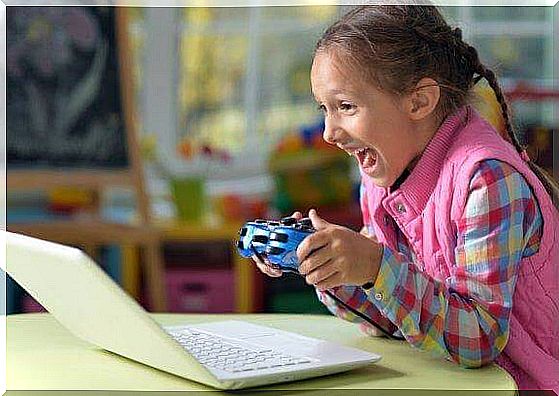Video Games: Addiction In Children
Video games are very popular with children and young people. They challenge their skills and are great fun. But often they also lead to addiction.

Video games are very popular with children and teenagers. They challenge their skills and are great fun. But often they also lead to addiction.
“My child is addicted!” is often heard by many mothers and fathers who despair when their child is constantly stuck in front of the screen and neglecting other things.
Numerous discussions ensue between the two sides about how much time the little ones spend in front of the computer. At the same time, the number of children and adolescents who are addicted to video games is increasing.
Like any other type of addiction, this addiction requires psychological treatment. However, parents can pay attention and find out if their son or daughter is really incapable of stopping playing.
This allows action to be taken before it becomes a serious problem.
Are video games dangerous for children?
Roblox, a popular video game platform for children and adolescents, became known in particular through a specific incident. In one of the games available there, the avatar of a 7-year-old girl was raped by two other users.
The platform allows users to design virtual worlds and their own games. It also guarantees the use of strict filters to protect children and young people around the world. Nevertheless, in this case the creator of the game was able to bypass the security systems.
The girl’s mother, Amber Petersen, shared on Facebook how she saw her daughter staring at the screen one morning in confusion. As she got closer, she saw that her daughter’s female character was raped.
Despite her dismay, she managed to take screenshots so that the incident could be reported immediately.
Roblox has 40 million online games and is actively used by more than 60 million children and young people. While the platform is actually known for its security, it becomes apparent that video games can never be 100% safe.
How do video games affect children?

The American Academy of Pediatrics recommends that children aged six and over should not play video games for more than two hours a day. In fact, gambling that doesn’t exceed a certain level can also have advantages.
It is important that it does not take up the time allotted for physical activity, rest and sleep. However, the problem starts where the incentive to play can no longer be controlled. This can have psychological consequences.
The neural patterns found in video game addicts indicate that there is an imbalance in the brain’s reward system. This is no different from other addictive behaviors.
In addition, desensitization processes can be triggered in cases in which the child is exposed to violent content from the video game.
These have an influence on the brain regions that are responsible for controlling emotions and attention and concentration processes.
What responsibilities do parents have?
Today’s generation is surrounded by technology, there’s no doubt about it. However, this does not mean that parents cannot control the age at which their children have access to the various electronic devices.
Attention should also be paid to what content they consume and how much time they spend in front of the screen.
It is therefore not surprising that children often develop addiction. Earlier and earlier they used smartphones or tablets to play games for hours without even knowing what kind of content it was.
Parents have the responsibility, to prevent the consumption of video games out of control and affect the normal daily lives of children and adolescents.
As soon as the little ones hold such a device in their hands for the first time, clear and strict rules must be drawn up. For example, how and how often the technology is used and what content is allowed is important.
However, mothers and fathers should also lead by example. This does not work if they are distracted by a screen while their children want to tell them something or want to play with them. Otherwise the rules are ineffective.
What are the warning signs?
If your son or daughter cannot stop playing video games either, certain warning signs may appear. In this case, it is necessary to take action before the situation escalates and your child’s balance is compromised.
- They worry about the game in an unusual way when they’re not in front of the screen and just talk about it.
- If your son or daughter does not play, there will be changes in humor or listlessness, aggressiveness, sadness, or defensive behavior.
- Your child devotes more time to play.
- They lose interest in playing with other children or hanging out with friends. It isolates itself.
- If he or she tries to reduce the time spent playing or to stop playing, he or she will fail.
- Your child will lie or deny when you ask how much time they spent playing.
- Your son or daughter cannot sleep, eat, or dress up to spend more time in front of the screen.
- No homework is done or bad grades are brought home. Playing a few minutes before learning can drag on for hours.
- In difficult moments, he or she uses all of his or her energy on video games and does not speak or discuss. The game is used to escape reality.
My child doesn’t want to stop playing, what should I do?
If a child or adolescent does not want to stop playing video games, there are certain measures you must take as a parent for his or her well-being.
Keep in mind, however, that discussions or crackdowns are not necessarily more effective than a mutual agreement. Negotiation should be the tool for setting boundaries and clear rules. Also, they should be asserted with steadfastness and love.
- Remove the console or computer from the room. They should be in a common area so that you can monitor play.
- Playing is allowed after homework and responsibilities have been fulfilled at home.
- Remind your child how many hours they can play each day. You can start with a slightly wider time frame and gradually reduce it.
- Let your son or daughter know when there are 15, then 10, and finally 5 minutes left to play so he or she can adjust.
- Teach you how to save game rounds. It is difficult to put the console down for a child who has managed to move up from one level to the next.
- Restrict access to games that are not age appropriate or contain violence.
- Encourage other activities to replace the time your child spends playing. You can encourage them to play sports or engage in artistic or social activities to get in touch with their peers.
- Introduce family activities. Share time with your son or daughter playing video games, board games and playing outside in the park.
- Discuss sanctions with your child that will apply if they fail to comply with agreements; for example, that one hour less or one day not at all can be played. Be steadfast when you have to use them.
Final reflection
If, after reading these suggestions, you find that the amount of time your child spends playing video games is beyond control, it could be an addiction. In this case, you should seek advice from a specialist.
A child or adolescent who cannot stop playing faces serious consequences. These can affect his physical, emotional and mental health.
Mothers and fathers are asked to help them cope with the problem: The well-being of the children depends primarily on the mindfulness of the parents.









